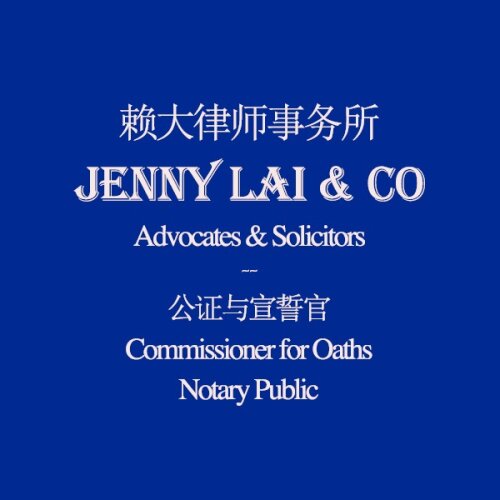Best Real Estate Contracts and Negotiations Lawyers in Singapore
Share your needs with us, get contacted by law firms.
Free. Takes 2 min.
Free Guide to Hiring a Real Estate Lawyer
Or refine your search by selecting a city:
List of the best lawyers in Singapore
About Real Estate Contracts and Negotiations Law in Singapore
Real estate contracts and negotiations in Singapore involve the legal processes concerning the sale, purchase, lease, and other transactions related to property. Singapore's real estate market is well-regulated, with laws designed to protect the interests of buyers, sellers, and landlords, ensuring transparency and fairness in all dealings. The principal laws governing these areas include the Conveyancing and Law of Property Act, the Sale of Commercial Properties Act, and the Residential Property Act, among others.
Why You May Need a Lawyer
Engaging a lawyer for real estate transactions can be crucial for several reasons. First, property contracts are legally binding and may contain complex terms and conditions requiring legal interpretation. A lawyer can help ensure that the contract reflects the understanding of the parties involved and contains no ambiguous terms that may lead to disputes later. Furthermore, lawyers assist in due diligence, checking for any liabilities or restrictions attached to the property. They can also provide guidance in negotiations, helping clients understand their rights and obligations while negotiating better terms.
Common situations where legal assistance might be necessary include:
- Buying or selling property, whether residential or commercial.
- Leasing agreements and tenant disputes.
- Handling property inheritance issues.
- Disputes over property boundaries or encroachments.
- Complex property transactions involving multiple parties.
Local Laws Overview
Understanding local laws is crucial when dealing with real estate contracts and negotiations in Singapore. Here are some key aspects:
- Conveyancing and Law of Property Act: Governs the legal transfer of property and includes specifics about contracts of sale and purchase.
- Residential Property Act: Places restrictions on foreign ownership of residential property, requiring government approval in certain cases.
- Land Titles Act: Details the registration of titles, interests, and transactions affecting land.
- Stamp Duties Act: Imposes duties on certain documents and clarifies the obligations of parties involved.
- Building Maintenance and Strata Management Act: Addresses issues related to the management of strata-titled properties, such as condominiums.
Frequently Asked Questions
What is conveyancing and why is it important?
Conveyancing is the legal process of transferring property ownership from the seller to the buyer. It ensures that the transaction is conducted in accordance with the law, safeguarding both parties' interests.
Do I need a lawyer for property transactions?
While not legally required for all types of transactions, having a lawyer can help ensure the legal accuracy of contracts and protect against potential pitfalls, especially in complex transactions.
What are option to purchase (OTP) and sales and purchase agreements (SPA)?
An OTP is a legal document granting the prospective buyer the option to purchase the property within a specific timeframe. An SPA is the final contract formalizing the terms and conditions under which the property will be sold.
Are foreigners allowed to purchase property in Singapore?
Foreigners can purchase certain types of properties in Singapore, such as condominiums, but may face restrictions on land or landed property, which often require special approval.
What legal protections exist for tenants?
Landlord and tenant relationships are governed by tenancy agreements, which should clearly outline rights and responsibilities. The Small Claims Tribunals handle rental disputes up to certain monetary limits.
What is the role of a conveyancing lawyer?
A conveyancing lawyer oversees property transactions, ensuring that all legal requirements are met, and handling the necessary due diligence and documentation.
What are common pitfalls in real estate negotiations?
Common pitfalls include unclear terms, overlooking property defects, not conducting proper due diligence, and mismatched expectations on timelines and deliverables.
How can I verify the legal status of a property?
Property legal status can be verified through checks at the Singapore Land Authority, assessing records for encumbrances or caveats affecting the property.
What is stamp duty, and who pays it?
Stamp duty is a tax on legal documents, including property transactions. The buyer typically pays it, and its amount varies depending on the property type and value.
How does the cooling-off period work in property transactions?
In some transactions, a cooling-off period allows the buyer to reconsider the purchase, meaning they can cancel the transaction within a specified timeframe without penalties.
Additional Resources
Several resources can be useful when dealing with real estate contracts and negotiations in Singapore:
- Singapore Land Authority (SLA): For land registration and property ownership information.
- Urban Redevelopment Authority (URA): Provides details on zoning and land use regulations.
- Council for Estate Agencies (CEA): Offers guidance on working with real estate agents.
- Law Society of Singapore: Can assist in finding qualified lawyers specializing in real estate law.
- Ministry of Law: General resource for information on legal requirements and processes.
Next Steps
If you require legal assistance in real estate contracts and negotiations, consider the following steps:
- Research: Familiarize yourself with basic real estate laws in Singapore to better understand your position.
- Consult a Lawyer: Engage a lawyer specializing in real estate law to get tailored advice for your situation.
- Review Documents Thoroughly: Before signing any contracts, ensure all terms are clear and comprehensible.
- Utilize Available Resources: Contact relevant governmental bodies or professional organizations for additional support and information.
- Stay Updated: Keep abreast of any changes in laws and regulations that might affect your property interests.
Lawzana helps you find the best lawyers and law firms in Singapore through a curated and pre-screened list of qualified legal professionals. Our platform offers rankings and detailed profiles of attorneys and law firms, allowing you to compare based on practice areas, including Real Estate Contracts and Negotiations, experience, and client feedback.
Each profile includes a description of the firm's areas of practice, client reviews, team members and partners, year of establishment, spoken languages, office locations, contact information, social media presence, and any published articles or resources. Most firms on our platform speak English and are experienced in both local and international legal matters.
Get a quote from top-rated law firms in Singapore — quickly, securely, and without unnecessary hassle.
Disclaimer:
The information provided on this page is for general informational purposes only and does not constitute legal advice. While we strive to ensure the accuracy and relevance of the content, legal information may change over time, and interpretations of the law can vary. You should always consult with a qualified legal professional for advice specific to your situation.
We disclaim all liability for actions taken or not taken based on the content of this page. If you believe any information is incorrect or outdated, please contact us, and we will review and update it where appropriate.
Browse real estate contracts and negotiations law firms by city in Singapore
Refine your search by selecting a city.












